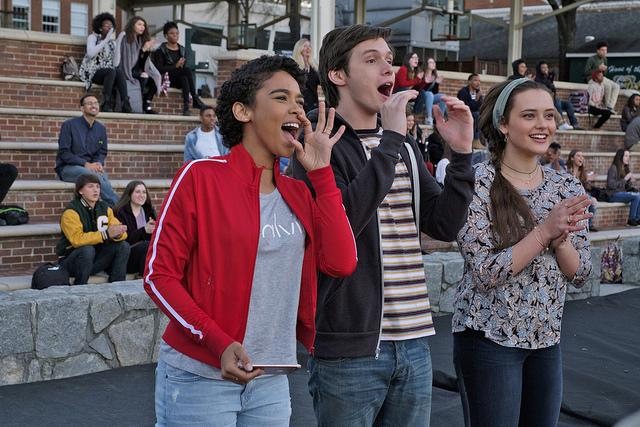Somewhere, a teenager’s eyes are glued to a movie theater screen.
Perhaps this teenager is a girl hiding her sexual identity from her homophobic father, or instead is a boy suffering from depression caused by peers’ bullying at school. In either case, it’s easy for feelings of isolation and fear to invade their thoughts.
The hypothetical experiences of these teenagers, however, is not so hypothetical after all. According to the Human Rights Campaign, the difficulties faced by those growing up LGBTQ+ in America are startling.
Among the most shocking, more than 90 percent of LGBTQ+ youth say they hear negative messages about being LGBTQ+ — with nearly 1 in 4 believing that things will not get better. LGBTQ+ youth are twice as likely as their peers to be physically assaulted.
While most young people face problems with classes and grades, most LGBTQ+ youth say their biggest problems are feeling unaccepted by family, being bullied at school and a fear of being out.
Despite an increased acceptance of LGBTQ+ individuals and the Supreme Court’s legalization of same-sex marriage in 2015, we live in an era where divisive rhetoric is prevalent and government policies often work against the safety of LGBTQ+ students.
Madison’s only LGBTQ comedy show Alphabet Soup replaces cruel punchlines with inclusive comedy
For an LGBTQ+ teenager enduring these challenges — or even one questioning their own identity — the recent wave of movies centered around LGBTQ+ individuals like “Love, Simon” and “Call Me By Your Name” are immensely powerful. An increase of LGBTQ+ stories and characters in movies and in public discourse is not only beneficial for members of the LGBTQ+ community — it is positive for society and those who seek a more accepting and open-hearted world.
First, these movies — specifically “Love, Simon” — often gear toward teenagers and young adults, beginning a vital conversation at an age when people are developing their attitudes and societal beliefs. These movies convey a touching and crucial message — every person has the right to feel comfortable in their own skin and be accepted for who they are.
For LGBTQ+ individuals, particularly youth, these movies offer a character to identify with and relate to — a reminder that they’re not alone even if they feel isolated. These films play a vital role in demonstrating to both LGBTQ+ and non-LGBTQ+ individuals that people in non-heterosexual relationships have love stories, too — normal and relatable ones, at that.
For people with homophobic biases, whether overt or subconscious, these movies often present non-heterosexual relationships in a manner that works to normalize them. For an LGBTQ+ teenager struggling to be accepted at home, these movies can play a part in changing their family’s beliefs, opening their eyes to their child’s struggle for love and acceptance.
Student panel explores self acceptance, changing landscape of LGBTQ+ community
But surely, there’s still more work to do.
As films involving LGBTQ+ characters appear in the mainstream, it’s clear that a pattern has emerged — these films have largely left the stories of LGBTQ+ people of color in the shadows. Undoubtedly, seeing more gay love stories on screen is a leap forward. But if this occurs while neglecting to tell all stories, then it is not so much a leap as a step.
This could be due to Hollywood’s primarily straight, white directors simply having backgrounds and experiences too detached from other identities, such as gay, black men, to feel an urgency to portray their stories. Or instead, these directors fear that a story featuring intersectional marginalized identities will not sell at the box office.
But while the recent surge in LGBTQ+ focused movies has not been without flaws, these films should be celebrated for playing an essential and significant role in bringing forth LGBTQ+ stories to the mainstream and promoting acceptance by non-LGBTQ+ people.
Most importantly, for LGBTQ+ teens all across the world, particularly those struggling with their identity, these movies offer both an escape and an encouraging vision: a promise that they are just as worthy of love as anyone else.
David Weinberg ([email protected]) is a sophomore double-majoring in Journalism and Political Science.





















